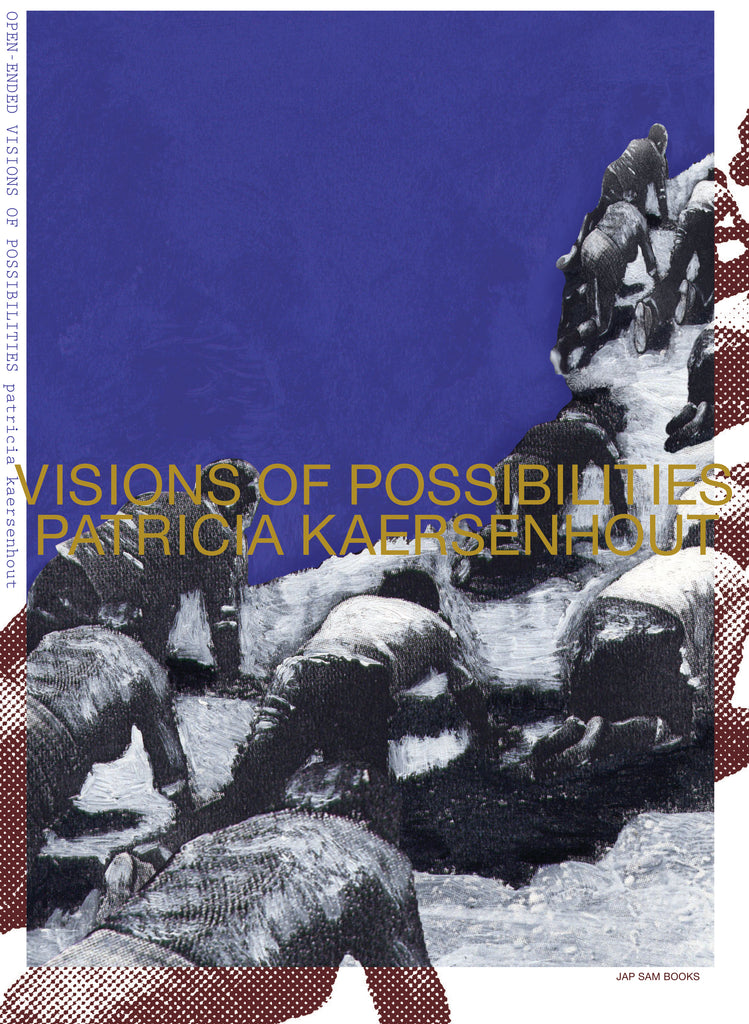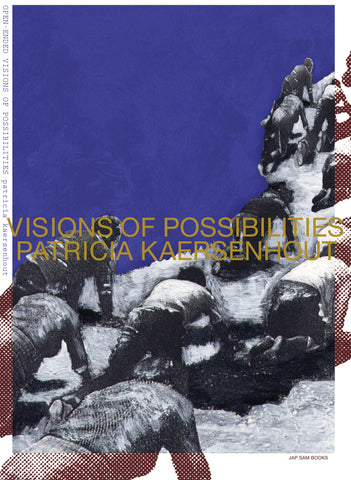Your cart is currently empty!
OPEN-ENDED VISIONS OF POSSIBILITIES. patricia kaersenhout
++++++
+++patricia kaersenhout+++
This book was published simultaneously with the solo exhibition Visions of Possibilities by patricia kaersenhout at Bonnefanten in Maastricht (June 10―November 5, 2023)
Promotional images by The Book Photographer.
AWARDED BEST DUTCH BOOK DESIGNS 2023
+++
| OPEN-ENDED VISIONS OF POSSIBILITIES holds thoughtful conversations, insightful contributions, and poetry exploring patricia kaersenhout's artistic practice and oeuvre over the years. Printed on leftover paperstock consisting of 14 different papers and fully loose-leafed, designed by Inedition (Eva van der Schans).
| Through her art, kaersenhout unveils profound ideas about connection, presence, and diasporic threads.
Open-Ended Visions of Possibilities speaks to the exploration and experimentation of possibility. What is made possible by artistic practice exploring archival erasure, historical silences, and Black feminist care practices? In dreaming up a multitude of visions and perspectives, kaersenhout allows us to journey with her artistic practice over the past decades.
This publication itself marks an important moment in her career by allowing the reader to oscillate between different geographies, works, and materials providing a rich and luscious sense of presence of kaersenhout's practice. Shaped by questions related to place, belonging, and the movement of African diasporas, kaersenhout goes beyond unveiling inequity and power structures, expanding our understanding of racial politics within a broader geopolitical framework. While kaersenhout's art could be read in response to forgotten histories, the cultural and political complexity of her work requires a close examination of how these histories are entangled with Dutch coloniality.
Through a visual practice, she unpacks how control, exploitation, domination, violence, and overall destruction continues to shape the ongoing legacies of colonialism and slavery. kaersenhout explores ideas of Dutch mastery alongside public memory and archival erasures. By requiring audiences to be active participants, she asks viewers to experience and feel through collective history and pain. Instead of solely making visible the violent histories and structures that permeate Dutch society, she asks us to reimagine and articulate the lives, experiences, and encounters of those that have long been excluded from mainstream archives.
With contributions by Barby Asante, La Vaughn Belle, Ingrid Braam, Jeannette Ehlers, Chandra Frank, Sasha Huber, Roel Hijink, Rashid Novaire, rolando vázquez, Gloria Wekker, and Selene Wendt.
"In many ways, we see her as someone who gathers – she gathers stories, narratives, textiles, and other materials. And, she also gathers us – as a community and an always – growing interwoven network of artists, thinkers, curators, activists, family, and more. kaersenhout gathers us in offering us spaces to dwell, making temporary shelter, and dreaming of possible futures." - Chandra Frank
About the artist
Born in the Netherlands but a descendant from Surinamese parents, visual artist patricia kaersenhout (1966) developed an artistic journey in which she investigates her Surinamese background in relation to her upbringing in a West European culture. The political thread in her work raises questions about the African Diaspora’s movements and its relation to feminism, sexuality, racism and the history of slavery. She considers her art practice to be a social one. With her projects she empowers (young) men and women of colour and supports marginalised people. By revealing forgotten histories she tries to regain dignity and create transformative justice. kaersenhout frequently has exhibitions in the Netherlands and abroad. Recently four major Dutch museums ‒ Stedelijk Museum Amsterdam, Centraal Museum Utrecht, Frans Hals Museum Haarlem and Van Abbemuseum Eindhoven ‒, acquired the installation Guess Who’s Coming to Dinner Too? (2017-2021). The installation refers to feminist artist Judy Chicago’s canonical work The Dinner Party. Only this time erased and forgotten Black and brown heroines of resistance are honoured at the table.
€35.00
OPEN-ENDED VISIONS OF POSSIBILITIES. patricia kaersenhout
€35.00
Art / Artist books / Awarded / Theory
This book was published simultaneously with the solo exhibition Visions of Possibilities by patricia kaersenhout at Bonnefanten in Maastricht (June 10―November 5, 2023)
Promotional images by The Book Photographer.
AWARDED BEST DUTCH BOOK DESIGNS 2023
| OPEN-ENDED VISIONS OF POSSIBILITIES holds thoughtful conversations, insightful contributions, and poetry exploring patricia kaersenhout's artistic practice and oeuvre over the years. Printed on leftover paperstock consisting of 14 different papers and fully loose-leafed, designed by Inedition (Eva van der Schans).
| Through her art, kaersenhout unveils profound ideas about connection, presence, and diasporic threads.
Open-Ended Visions of Possibilities speaks to the exploration and experimentation of possibility. What is made possible by artistic practice exploring archival erasure, historical silences, and Black feminist care practices? In dreaming up a multitude of visions and perspectives, kaersenhout allows us to journey with her artistic practice over the past decades.
This publication itself marks an important moment in her career by allowing the reader to oscillate between different geographies, works, and materials providing a rich and luscious sense of presence of kaersenhout's practice. Shaped by questions related to place, belonging, and the movement of African diasporas, kaersenhout goes beyond unveiling inequity and power structures, expanding our understanding of racial politics within a broader geopolitical framework. While kaersenhout's art could be read in response to forgotten histories, the cultural and political complexity of her work requires a close examination of how these histories are entangled with Dutch coloniality.
Through a visual practice, she unpacks how control, exploitation, domination, violence, and overall destruction continues to shape the ongoing legacies of colonialism and slavery. kaersenhout explores ideas of Dutch mastery alongside public memory and archival erasures. By requiring audiences to be active participants, she asks viewers to experience and feel through collective history and pain. Instead of solely making visible the violent histories and structures that permeate Dutch society, she asks us to reimagine and articulate the lives, experiences, and encounters of those that have long been excluded from mainstream archives.
With contributions by Barby Asante, La Vaughn Belle, Ingrid Braam, Jeannette Ehlers, Chandra Frank, Sasha Huber, Roel Hijink, Rashid Novaire, rolando vázquez, Gloria Wekker, and Selene Wendt.
"In many ways, we see her as someone who gathers – she gathers stories, narratives, textiles, and other materials. And, she also gathers us – as a community and an always – growing interwoven network of artists, thinkers, curators, activists, family, and more. kaersenhout gathers us in offering us spaces to dwell, making temporary shelter, and dreaming of possible futures." - Chandra Frank
About the artist
Born in the Netherlands but a descendant from Surinamese parents, visual artist patricia kaersenhout (1966) developed an artistic journey in which she investigates her Surinamese background in relation to her upbringing in a West European culture. The political thread in her work raises questions about the African Diaspora’s movements and its relation to feminism, sexuality, racism and the history of slavery. She considers her art practice to be a social one. With her projects she empowers (young) men and women of colour and supports marginalised people. By revealing forgotten histories she tries to regain dignity and create transformative justice. kaersenhout frequently has exhibitions in the Netherlands and abroad. Recently four major Dutch museums ‒ Stedelijk Museum Amsterdam, Centraal Museum Utrecht, Frans Hals Museum Haarlem and Van Abbemuseum Eindhoven ‒, acquired the installation Guess Who’s Coming to Dinner Too? (2017-2021). The installation refers to feminist artist Judy Chicago’s canonical work The Dinner Party. Only this time erased and forgotten Black and brown heroines of resistance are honoured at the table.













































